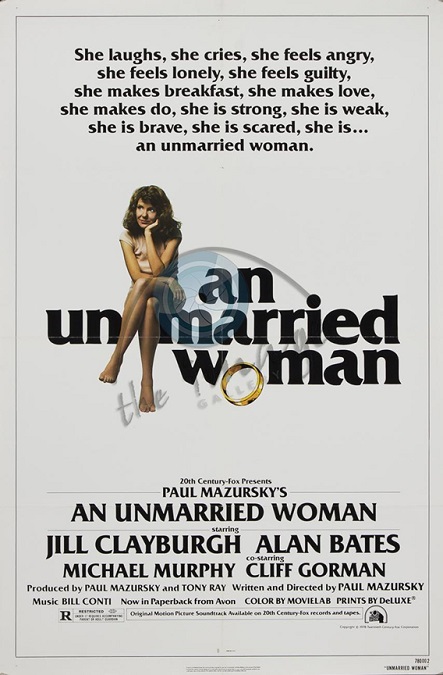
An Unmarried Woman – 1978
This was a movie that appears to be very relevant to the time in which it was released. It touched on the Feminist Movement of the late 70s. The movie had a really simple plot that followed a woman whose husband leaves her for a younger woman. She is forced to become a single mother. The film was about her struggles to become independent, and consequently, happier.
Jill Clayburgh was very good as Erica Benton. She was the common woman. There was nothing extraordinary about her. She was married and, like many women, only ever knew physical and emotional love with one man, her husband, Martin, played by Michael Murphy. He was supposed to be a good and hard-working man, a loving father, and an attentive spouse. However, he had a little flaw. He was cheating on his wife.
Actually, though Martin was supposed to be all those things, I didn’t like his character. What I mean is, even before he confessed his infidelity to his wife, I didn’t like him. He was a jerk. He was irritable and got angry easily, inexplicably blamed his wife for ridiculous things, and got vocally upset when Erica wasn’t in the mood to have sex with him. But fortunately, he wasn’t the focus of the movie.
In An Unmarried Woman, Erica is forced to endure all the negative emotions that are associated with the betrayal of a cheating husband. The film takes a little time to show her depressed, frightened, angry, accepting, hopeful, and eventually happy, all understandable emotions. And Clayburgh did a good job with all of them. She is helped through her divorce by her daughter, Patty, played by Lisa Lucas, and her group of friends, Sue, Elaine, and Jeanette, played by Patricia Quinn, Kelly Bishop, and Linda Miller.
Some of the most memorable scenes, for me, were Erica’s sessions with her therapist, Tanya, played by Penelope Russianoff. I liked Tanya. She was calm and attentive, and she assisted Erica through some of the film’s deepest emotional moments, scenes where Erica dissolves into tears over her fears and her anger. Tanya also helped Erica to explore a sort of sexual awakening, touching on the Sexual Liberation Movement.
Erica, in an attempt to get over her depression and sexual repression, tries to have a meaningless affair or two. The first one doesn’t work out so well because she recklessly chooses a really sleazy guy, Charlie, played by Cliff Gorman. But on her second try, she finds both love and happiness with Saul, a talented British artist, played by Alan Bates. And just as an incidental note, the artist who created Saul’s wonderful abstract expressionist paintings for the film was the internationally renowned Paul Jenkins.
But here, critics say, is where the movie seems to undermine its own agenda. The film was about following a woman who had been wronged along the road to her independence. But in the end, it appears to be clear that she doesn’t want to be independent. To quote from Wikipedia, “The two main criticisms … are that An Unmarried Woman is not relatable to all women because of the affluent life that Erica lives, and that even though the film shows Erica’s journey to independence, she ultimately does not want to be alone, and seeks out a relationship with Saul.”
But I completely disagree. The critic who wrote that obviously didn’t watch the end of the movie. So she has been dating Saul, and is falling in love with him. In fact, he has broached the subject of marriage. He has a place in Vermont in which he will be staying for 5 months. He asks her to go with him. The point is that she says no. She has learned to be happy with her newfound independence and is not ready to give it up.
Jill Clayburgh unfortunately didn’t win the Academy Award for her performance, but there is no denying that she did a good job. She portrayed the raw emotions and vulnerability of her character with depth and skill. And I really enjoyed Alan Bates’ performance as well. He was such a good guy, though he was not perfect. He seemed to be emotionally rushing Erica, which had the effect of pushing her away a little. In fact, I think the two of them had a very good on-screen chemistry, elevating the film from simply average to quite good.

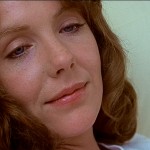

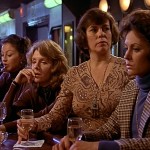
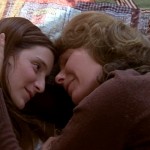
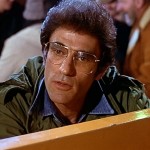
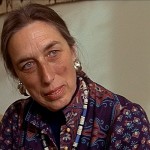


Alan Bates is swooningly handsome, debonair and charming in An Unmarried Woman. Ms. Clayburgh is a total delight in the role.
I am a huge “An Unmarried Woman” fan and thought Jill Clayburgh was terrific in this film. But she didn’t win the Academy Award for her portrayal of Erica Benton, although she was nominated. I believe Jane Fonda won the Oscar for best actress in 1979. Nevertheless, I enjoyed reading your summary of one of my favorite movies.
Thank you for the comment! You are absolutely right. Jane Fonda won for Coming Home. I have corrected the article appropriately. Thanks again, Mark!